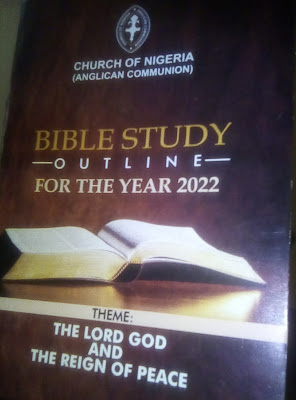Anglican Bible study - STUDY 20, MAY 15, 2022
STUDY 20
Anglican Bible study - STUDY 20, MAY 15, 2022, 4TH SUNDAY AFTER EASTER MAY 15 2022
THEME: THE LORD GOD AND THE REIGN OF PEACE
SUB THEME: Mandate of God to Earthly Leaders-1
TOPIC: Discretion
TEXT: Gen 41:33-41
AIMS:
i. to call our attention to Discretion as God’s mandate for our lives and
ii. to examine how discreet our contemporary leaders are in their ways of governance.
INTRODUCTION
Discretion is defined as the right to make choices; it is an attribute of one who is careful about what they do or say (being discreet or prudent) without selfish aim to self-aggrandizement. An example of discretion is the ability of a judge to determine a verdict. A good and biblical example is seen in Joseph, whose discretion was never aimed at self-aggrandizement (Gen 41:33) and King Solomon’s judgment/verdict (1Kings 3:16-28). The mandate of God to earthly leaders includes making responsible decisions; decisions that will favour the followership without prejudice. This among other things will be made possible by selfless service, being wise, and having the fear of God.
STUDY GUIDE
1. From our text, what do you understand by discretion? How is it a necessity for leaders?
2. Read Psalm 112:5 and Prov. 2:11 and explain how important discretion isfor those in authority? Ref: 1Kings 3:16-28
3. Discuss how our contemporary leaders are failing in providing good governance. Isaiah 28:14-15; Matt 23:14
4. How can our lifestyle as Christians populate the kingdom of God? Gen 41:38; Pro 9:10; Matt. 5:14-16.
CONCLUSION
A discreet leader will save him/herself and his/her generation, when he/she executes good governance, averting adverse consequences for the people he/she leads and him/herself.
FOOD FOR THOUGHT: A leader with discretion shall save him/herself and his/her generation
MEMORY VERSE: Pro 2:11 “Discretion shall preserve thee, understanding shall keep thee”.

